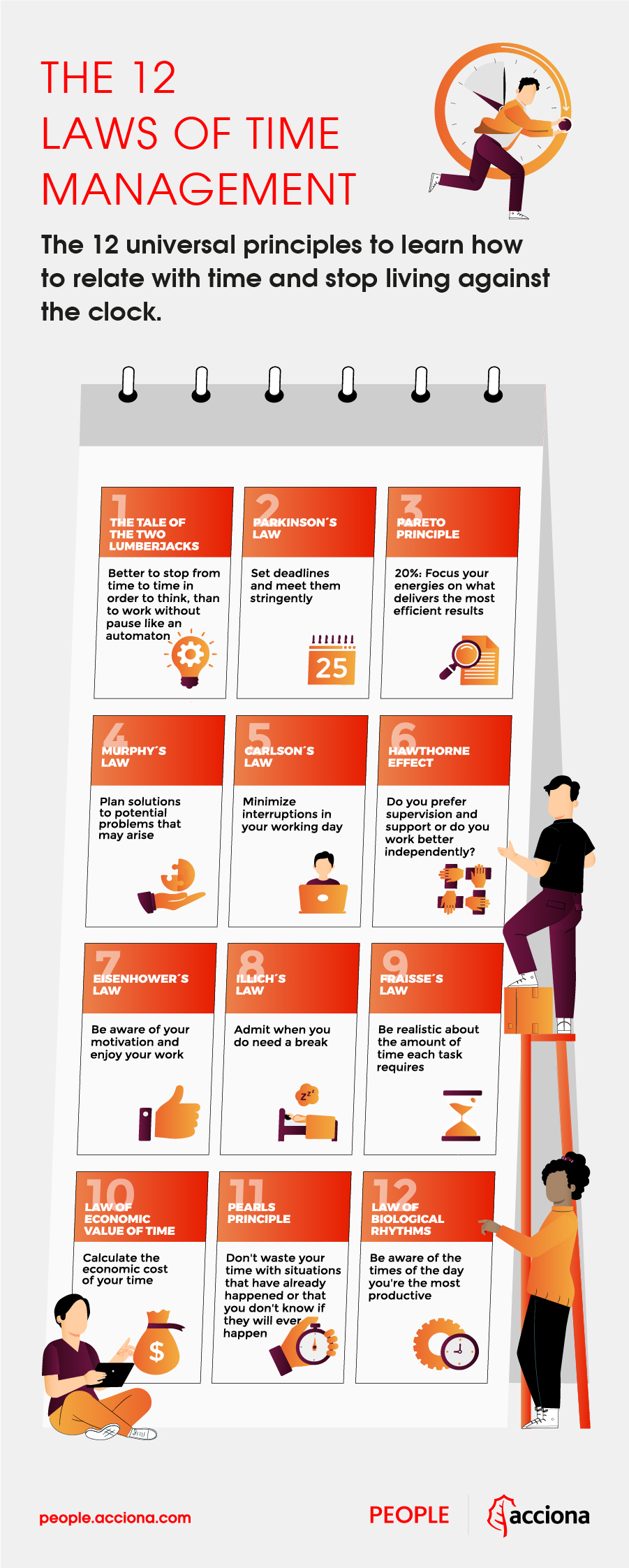The arrival of adulthood brings with it a fatal discovery that we were not so aware of before, when life seemed full of fewer worries: days have only 24 hours and time management at work and in our personal lives becomes more complicated. Just a couple of dozen hours in which to take care of the working day, the house, shopping, cooking, family, partner, friends, sport and leisure, if there are any free minutes left for this. And that’s not counting the 8 hours we should sleep!
Did you get a little stressed reading this first paragraph? That’s normal. But we encourage you to continue reading the article. It’ll help you find the keys to proper time management.
In this article you will find:
- What is time management?
- How to manage time at work?
- Know the advantages of being the owner of your time
What is time management?
Do you have the feeling that you could be more productive if you had a few more hours? If your answer is yes, then answer this second question: how many hours would you add just by not thinking so many times that you need more time?
Time management is the skill that a person acquires when he/she is able to structure, preserve and adjust the time he/she has available, even when faced with unforeseen or changing situations.
According to a recent study on how to develop this skill successfully, there are three key points:
- Be realistic and assume that time is a limited resource.
- Design and organize goals, plans, schedules and tasks to use time effectively.
- Monitor the use of time while performing a certain activity, including possible interruptions.
¿ How to manage time at work?
Time management at work is essential not only because it helps us to be more efficient, but also because it avoids health problems such as stress or anxiety. It’s essential to learn to relate to time without feeling that we are continually racing against the clock. Seconds, minutes and hours pass at the same speed for everyone, however, not all of us use and manage time in the same way.
“It is essential to learn to relate to time without feeling that we are continually racing against the clock”.
That’s why today we bring you the 12 laws of time. A dozen tips that can teach us how to stay on top of the clock without feeling like we’re not getting the most out of every second and giving us a better quality of life.
1. The tale of the two woodcutters
Who cuts down more trees? The lumberjack who doesn’t stop, or the one who stops every so often to sharpen the axe? Not everything is effort and dedication. It is necessary to pause and think in order to reach your goals.
Smart work involves investing time in assessing the situation we are in, considering solutions and even contemplating rest as a mechanism that increases our productivity and prevents us from ending up burnt out.
2. Parkinson’s Law, or stretching a task ad infinitum
This law states that “all work is indefinitely dilated until it occupies all the time available for its completion”.

What does this mean? That, if we don’t set a deadline, we can stretch a task to infinity. In other words: procrastination takes over our productivity.
The solution is very easy: set deadlines to the tasks and commit to the maximum to meet the deadlines.
3. Pareto’s Law, or focusing on the most “profitable”.
“Approximately 80% of the consequences come from 20% of the causes” What does this statement lead us to? To the fact that 20% of a person’s work contributes to generate 80% of their results and vice versa. It’s essential to know which are the areas of our work that offer greater results and focus on giving the best of us while performing them.
4. Murphy’s Law, or avoiding self-fulfilling prophecies
We’re all familiar with the famous statement “if something can go wrong, it will go wrong.” But we can avoid it by always trying to have all the ropes tied up tightly. Plan for the unexpected and learn from your past experiences.
5. Carlson’s Law, or Avoiding Distractions
This law states that “any interrupted activity is less efficient and time-consuming than if it is done continuously.” Luckily, the solution to this problem is quite simple: reduce interruptions in your workday as much as possible.
Avoid having anything nearby that might distract you. Try to manage errands or calls in advance before getting into more dense tasks or tasks that require a higher level of concentration. If you work from home, set up your space so you can focus on your responsibilities and be as comfortable as possible. You can find some tips on the subject here.
6. Hawthorne's Principle, or the pressure of the all-seeing eye
“If we are being watched in our work, it influences the results we get”, says this principle. Do you feel like Big Brother when you’re in the office? Or do you think you’re lazy when no one is watching? Having eyes on us when we work can be positive or negative, it all depends on our personality and the way we work.
There are people who are more productive when they have supervision, support or control from someone, and others who decrease their productivity when they know they’re being watched. Know yourself and decide what works best for you – do you prefer supervision and support or do you work better independently?
7. Eisenhower’s Law, or the fortune of believing in what you do
Surely, you’ll also like this law: “If we have a compelling reason to do something, we’re more committed to it”. When you know why you want to do something and you know your motivation, you become almost unstoppable.
Research by the University of Warwick, in conjunction with the Opener Institute for People and the Wall Street Journal, has drawn clear conclusions regarding this relationship between motivation and performance. It showed that when an employee is happy with their job, they are 12% more productive and 31% more effective.
If what you want to achieve fulfills you and makes you happy, the number of excuses decreases and your commitment to your goal increases. Conclusion? Know your motivation and enjoy your work.
8. Illich’s Law, or the gift of knowing when to throw the pen away.
“We all have a threshold of efficiency, within which the more time you spend on something, the more saturated you are and the worse the task you are going to execute.” What lesson do we draw from this statement?
Well, we’re not machines and, as our fatigue increases, our efficiency decreases. Time management at work also involves knowing how many hours you are productive and respecting scheduled time.
In June 2021, Gallup reported that 74% of the world’s workers are tired from remote work. For many, working from home means being online all day, if only because they check every half hour to see if a new email has arrived. You need to disconnect and rest to be able to perform properly the next day.
9. Fraisse’s Law, or knowing how to enhance the uniqueness of each one of us.
According to this law, “everyone needs certain times to do certain tasks”. Something totally true. As we said in the previous point, we’re not machines. Each person has their strengths and weaknesses, things that they’re better or worse at or that they enjoy more.
Therefore, in our list of tasks there will be some that we will do faster and others slower depending on our skills and experiences. Know the time you need for each task and consider leaning on a colleague who is better at something specific to get a project done if you see that you are pressed for time.
10. Law of the Economic Value of Time, or the classic “time is money”
“Establishing the value of each hour of work (hourly cost), determines the loss generated by unproductive time”. Basically, what this law says is that you convert your minutes into money. And knowing how much it costs you to perform a certain task will indicate the profitability of your project.
11. Perls’ Principle, or the idea of living in the present
This law reminds us that “70% of what concerns us has already happened or will never come to happen.” What does this mean? It means that we waste a lot of time thinking about situations that we have no control over and that are either in the past or in the future.
Become aware of whether that thought that’s going around in your head is productive or not. Does it have a solution? Find the most efficient and the one you feel most comfortable with.
No solution? Maybe it’s time to turn the page and focus your attention and energy on other matters.
12. Law of biological rhythms, or the aphorism “know thyself”.
“Each person is subject to multiple biological rhythms that must be taken into account when scheduling activities.” What do we learn from this statement? It’s important to know if we’re more productive in the morning or in the afternoon, if on Mondays we can get on with more brainy tasks or it is better to dedicate ourselves to organize other things instead, for example. Understand when you’re more productive and make the most of every moment.

Know the advantages of owning your time
When done effectively, time management at work makes it easier to get more done in less time. Even when we have to deal with tight deadlines, unforeseen events or a long to-do list. The benefits of becoming the master of your time are multiple and affect several aspects of our life, but when we talk about work the main ones are the following:
- Increased performance and efficiency.
- Greater enjoyment of work and better results.
- Deadlines are met and we stop living enslaved by the hands of the clock.
- Allows for a better work-life balance
- We manage to have time for training and become better professionals.
The time to begin applying these time management tips at work is now. Start by setting small goals and implementing the laws that seem easiest for you or that you think will work best for you. Before you know it, you’ll never say “I don’t have enough time” again and you’ll be able to increase your productivity.
Sources:
https://journals.aom.org/doi/abs/10.5465/amp.2016.0166
https://people.acciona.com/es/cultura-organizacional/la-cultura-organizacional-y-sus-tipologias/


